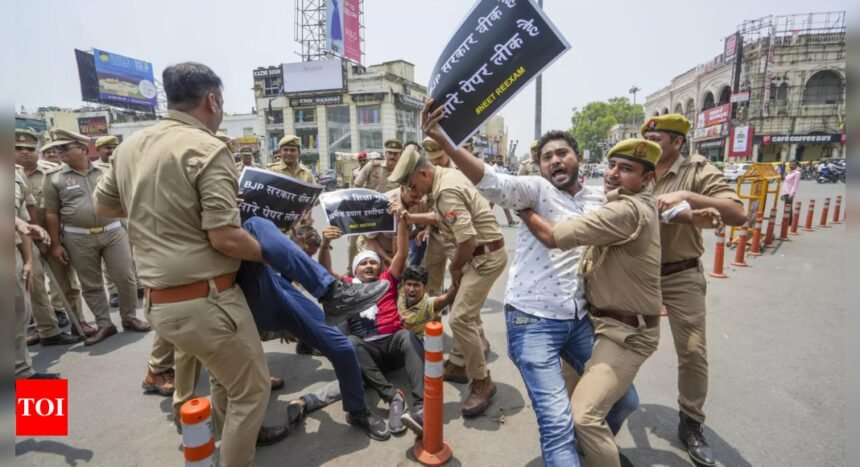NEW DELHI: Amid massive uproar across the country over the NEET-UG & UGC-NET paper leak cases, the Indian Cybercrime Coordination Centre, or I4C has played an important role in identifying the possibility of loopholes in these entrance examinations.
The I4C, which is an initiative of the ministry of home affairs, looks into the matters concerning cybercrime in the country in a “coordinated and comprehensive manner”.
The ministry on Thursday clarified that it did not receive any complaint against the UCG-NET exam.
The ministry said it was in fact the I4C, acting on the inputs of which, the government concluded that the integrity of UGC-NET 2024 was compromised and cancelled the examination. The government has declared that a fresh examination will be conducted and dates for the same will be announced soon.
Additionally, the government has also handed over the 2024 UGC-NET paper leak cases to the Central Bureau of Investigation (CBI).
What is I4C?
The I4C is focused on resolving all the issues related to cybercrime for the citizens, which includes improving coordination between various law enforcement agencies and the stakeholders, driving change in India’s overall capability to tackle cybercrime and “improving citizen satisfaction levels”.
The platform functions as a hub for sharing information and improving response mechanisms against cybercriminal activities. With a nationwide approach, it seeks to bring together multiple stakeholders to create a cohesive strategy to counter cyber threats. The I4C was constituted on January 10, 2020 by Union home minister Amit Shah.
Why was I4C needed?
As cybercrime cuts across national boundaries, it mandates effective coordination among various stakeholders across different jurisdictions. In response to this increasing threat, the ministry of home affairs (MHA) established an expert group to identify gaps and challenges, develop a roadmap, and provide recommendations for combating cybercrime in the country.
The exponential increase in internet usage and rapid technological advancements has led to a surge in cybercrime cases worldwide. Therefore, international collaboration at various levels is essential for tackling this form of transnational crime efficiently.
The expert group, after assessing the gravity of the situation, recommended the creation of the Indian Cybercrime Coordination Centre (I4C) — an initiative to fortify the overall security framework and improve the nation’s resilience against Cybercrime.
Objectives of I4C
The I4C, which is an initiative of the ministry of home affairs, looks into the matters concerning cybercrime in the country in a “coordinated and comprehensive manner”.
The ministry on Thursday clarified that it did not receive any complaint against the UCG-NET exam.
The ministry said it was in fact the I4C, acting on the inputs of which, the government concluded that the integrity of UGC-NET 2024 was compromised and cancelled the examination. The government has declared that a fresh examination will be conducted and dates for the same will be announced soon.
Additionally, the government has also handed over the 2024 UGC-NET paper leak cases to the Central Bureau of Investigation (CBI).
What is I4C?
The I4C is focused on resolving all the issues related to cybercrime for the citizens, which includes improving coordination between various law enforcement agencies and the stakeholders, driving change in India’s overall capability to tackle cybercrime and “improving citizen satisfaction levels”.
The platform functions as a hub for sharing information and improving response mechanisms against cybercriminal activities. With a nationwide approach, it seeks to bring together multiple stakeholders to create a cohesive strategy to counter cyber threats. The I4C was constituted on January 10, 2020 by Union home minister Amit Shah.
Why was I4C needed?
As cybercrime cuts across national boundaries, it mandates effective coordination among various stakeholders across different jurisdictions. In response to this increasing threat, the ministry of home affairs (MHA) established an expert group to identify gaps and challenges, develop a roadmap, and provide recommendations for combating cybercrime in the country.
The exponential increase in internet usage and rapid technological advancements has led to a surge in cybercrime cases worldwide. Therefore, international collaboration at various levels is essential for tackling this form of transnational crime efficiently.
The expert group, after assessing the gravity of the situation, recommended the creation of the Indian Cybercrime Coordination Centre (I4C) — an initiative to fortify the overall security framework and improve the nation’s resilience against Cybercrime.
Objectives of I4C
- The I4C serves as a central hub to curb cybercrime across the country. By acting as a nodal point, it aims to coordinate efforts and streamline processes to effectively address and reduce cyber-related incidents.
- It is dedicated to tackling cybercrimes targeting women and children. The vulnerable groups often face significant threats online. Therefore, it is responsible for enhancing protection measures by prioritizing these cases.
- The centre facilitates the easy filing of cybercrime-related complaints and identifies emerging trends and patterns in cybercriminal activity.
- Acting as an early warning system for law enforcement agencies, it provides crucial information and insights for the proactive prevention and detection of cybercrimes
- Creating awareness among the public about preventing cybercrime is another key aspect I4C work area.
- It also assists states and Union Territories in the capacity building of police officers, public prosecutors, and judicial officers in areas such as cyber forensics, investigation, cyber hygiene, and cyber criminology.








